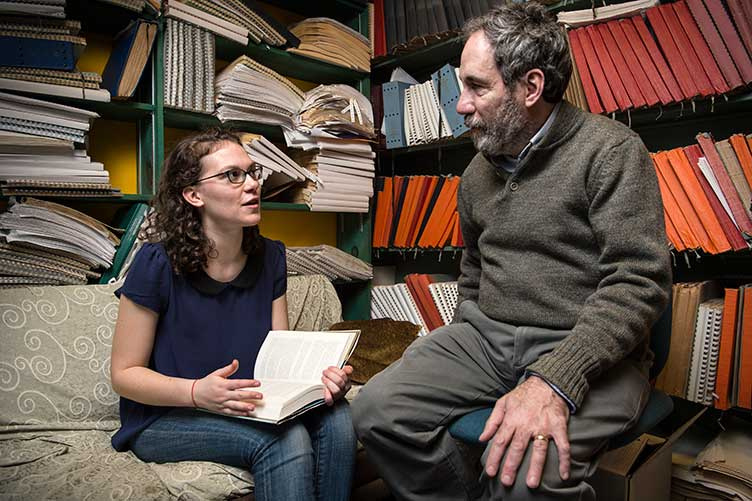
Falling for Ibsen
When Isabelle Beagen '18 read “A Doll’s House” by Henrik Ibsen in her freshman theatre history course, she fell in love.
“Ibsen is a writer in which every prop, every line, every costume piece is intricately connected and important … every time I read it I discovered something new. It was like a treasure hunt,” says Beagen.
She was also drawn to the central character, Nora, who leaves her husband and children to be true to herself and discover who she really is. Beagen was fascinated to learn of the visceral — and negative — audience reactions to Nora’s choice. The play struck a chord with her.
“A Doll’s House” was written in 1879 by a Norwegian playwright, director and poet whose work peeled away layers of deception and societal dysfunction to expose the moral failures of his time. Ibsen created complicated and flawed middle-class characters struggling with the human condition and often failing, including a series of strong females the likes of which had not been seen on stage before — Nora in “A Doll’s House” among them.
That an American college student separated from Ibsen by more than 130 years, an ocean, language, nationality and gender finds his work personally relevant speaks to the power of theatre. Ibsen helps Beagen see the struggles in her own life a little more clearly — her own desire to break free from societal expectations and learn who she is in a world where people are too quickly labeled.
Ibsen, Marx and a Weighty Question
To learn more about Ibsen, Beagen decided to pursue a Research Experience and Apprenticeship Program (REAP) fellowship. She begged theatre professor David Richman to nominate her for the award, she says, though Richman remembers it differently.
“She came into my office — and she’s a really good student and I’m very fond of her — and said forcefully, ‘David, I want you to nominate me for a REAP.’ And I said ‘yes, ma’am,’” recounts Richman with a proud smile.
Richman suggested that Beagen study the connections between Ibsen and Eleanor Marx, the youngest daughter, helpmate and biographer of Karl Marx. Eleanor had been one of the first to introduce Ibsen’s work to the English-speaking world: She gave the first staged reading of “A Doll’s House” in England at her home, translated two of his plays and wrote extensively about others. Like Ibsen’s characters, Marx was a strong woman — a feminist and outspoken socialist who picketed, gave speeches and led a trade union. She flouted social norms by living with a man outside of marriage. But she committed suicide at age 43 when she found her partner — widely thought to be a manipulative, self-centered philanderer — had secretly married someone else.
“Why does this Ibsen pioneer, this independent woman, which is what Ibsen is all about, get going on this jerk and then kill herself?” asks Richman. “That’s the question, and it’s not a question which I have the emotional equipment to answer as much as Isabelle would or any bright woman would. It’s tailor-made for Isabelle because of her interest in Ibsen.”
Beagen won the REAP fellowship and set about answering the question. She read eight Ibsen plays in multiple translations, two biographies of Eleanor Marx and any other scholarship she could get her hands on. As she puts it, she studied history through theatre and theatre through history. In a discovery that bordered on the uncanny, she found multiple connections between Marx’s biography and Ibsen’s female characters — as if Marx had been the real-life embodiment of Ibsen’s fictional women. And, as frustrating as she found Marx’s suicide, she felt she better understood the context in which such a choice could be made.
“Eleanor Marx struggled to be independent in a society where she had no independent female role models,” says Beagen. Like some of Ibsen’s characters, Marx had an overbearing father and an immoral “husband” who made huge demands on her energy. She struggled with duty and tended to sacrifice her own well-being to help others. Despite her independence, she was still bound by social norms. “I think there was a part of her that was very independent and very strong but there was another part of her that, when she was with Edward Aveling, her partner, was a very feminine, docile woman who wanted to be taken care of,” says Beagen, drawing on the ideas of Marx biographer Rachel Holmes.
Like Marx, Ibsen’s characters often do not succeed in their struggles. More than one Ibsen woman commits suicide.
Impacting Lives

The most important thing about her research, Beagen says, is that it shows the impact that theatre can have on a person’s life. Based on her research, she suggests that Ibsen’s plays provided Marx with insight into her own struggles — much as they have for Beagen herself — and allowed her to start conversations with herself about those struggles.
“People often underestimate the importance of theater,” she says, “but what I found is why theater is important and why it stays around. I live in an entirely different era than Ibsen, and I don't have the same struggles that the characters do, but the ideas behind the struggles are still there and it's still relatable and that's why people continue to do his work. That's why people continue to do Shakespeare. The impact of theatre is that it changes how people think.”
Beagen’s research also changed how she thinks about her studies at UNH. Now a theatre major, she wasn’t when she started the REAP project. Though she had acted in plays since the third grade, she wasn’t interested in a life of auditioning. But through Richman’s course and then the REAP project, Beagen discovered a passion for theatre history. “It was life-changing,” she says. Now she plans to pursue a career in dramaturgy.
As for her Ibsen/Marx project, she’s not done yet. She hopes to conduct research in England to dig deeper into Marx, for which she’ll apply for an International Research Opportunities Program grant. Then she’ll write a play about Ibsen and Marx in the style of Ibsen, performing it for her senior capstone project. “No, I haven’t written a play before,” she says, laughing, but she’s already developing dialogue.
If theatre has the power to impact people’s lives, then Beagen herself is a perfect example of that impact. Not only a great proponent of theatre’s relevance, she demonstrates that relevance in her own life. A foray into theatre history has opened her mind and heart to a new passion and path for life after commencement.
Originally published by:
The College Letter, the newsletter of the UNH College of Liberal Arts
-
Written By:
Susan Dumais '88 '02G | College of Liberal Arts



















































